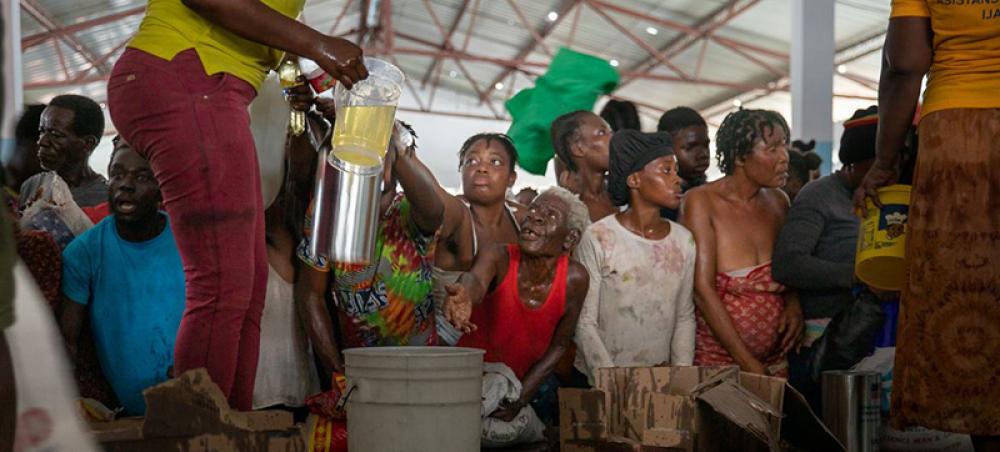Just Earth News | @justearthnews | 13 Sep 2023, 05:01 am Print
 WFP
WFP Photo Courtesy: WFP/Theresa Piorr
The UN World Food Programme (WFP) said on Tuesday that a historic funding shortfall was forcing it to “drastically” cut rations in most of its operations, potentially pushing an additional 24 million people to the brink of starvation over the next 12 months.
With a funding gap of over 60 per cent, WFP’s chief economist Arif Husain said the organization had “never seen this type of shortfall” in its 60-year history.
As contributions decline but needs rise, the UN agency said “massive reductions” have already been implemented in almost half of its operations.
The latest analysis from the agency shows every one per cent cut in food assistance pushes 400,000 people into emergency hunger.
The lack of funding comes at a time of massive jump in needs which started with the COVID-19 pandemic and compounded by the war in Ukraine.
Some 345 million people in the world already face acute food insecurity; this includes 40 million suffering emergency levels of hunger and at risk of dying from malnutrition. This number has doubled since 2020.
“With the number of people around the world facing starvation at record levels, we need to be scaling up life-saving assistance – not cutting it,” said WFP Executive Director Cindy McCain.
Hunger hotspots
Cuts have already been felt across many of the 79 WFP operations globally including Afghanistan, Bangladesh, Democratic Republic of Congo (DRC), Haiti, Jordan, Palestine, South Sudan, Somalia and Syria.
This year, 10 million people have lost support from the agency across Afghanistan – whilst more than one-third of the population still go to bed hungry every night.
Due to a series of consecutive rations cuts, the UN agency will only be able to support three million people per month across the country from October.
In Syria, 5.5 million people who relied on WFP for food were already on 50 per cent rations and in July the agency subsequently cut all rations by half again.
The agency says the ripple effects of these cuts in life-saving aid will cause emergency levels of hunger to “skyrocket even higher.”
Funding cuts
Explaining the reasons for such a drastic drop in resources, the WFP said funding from traditional donors is insufficient.
With a 41 per cent drop in funding, donor fatigue and spending on the COVID-19 pandemic are also contributing factors.
According to Mr. Husain, matters are made worse as lower-income buckle under the burden of record high levels of debt, resulting in an inability to purchase essential food.
He underscored the need to broaden WFP’s donor base and to address the root causes of the rise in global hunger, such as the impact of conflict, insecurity and climate change.
“If we don’t address the root causes why should the situation change,” he emphasised.
The doom loop
Last year, the UN agency reached a record number of 160 million people, stabilising many situations of hunger and famine globally. This was with 41 per cent more funding than is currently available for this year.
This level of assistance delivered means that for now “the number of people who are in crisis level or worse hunger situations, is relatively stable,” according to Mr. Husain.
“If that assistance goes away in a drastic way, that means we will start to see additional suffering.”
As needs increase due to economic shocks, conflict and climate extremes, 783 million people globally are unsure of where their next meal is coming from.
Experts at WFP fear that a humanitarian ‘doom loop’ is being triggered, where the UN agency is being forced to save only the starving, “at the cost of the hungry.”
Mr. Hussain warned that unless there is investment in early response and community resilience "we continue the cycle of emergency to emergency.”
“We are saving the same lives again and again and again.”
- Viral Irish food bank photo sparks shocking racist attacks on Indians
- Caught on camera: Two foreigners assaulted in Israel in an alleged racial attack
- Pakistan: Parents heartbroken after court sides with man accused of kidnapping minor Christian girl
- Pakistan: Trafficked 35 years ago, Bangladesh-born woman approaches court against FIA for offloading her from flight!
- Hindu tea worker found bound and bloodied in Bangladesh garden during general elections; investigation underway





-1763561110.jpg)
